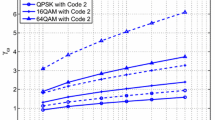Abstract
In this paper, we construct a finite-state Markov chain model for a Rayleigh fading channel by partitioning the range of the received signal envelope into K intervals. Using a simulation of the classic two-ray Rayleigh fading model, a Markov transition probability matrix is obtained. Using this matrix to predict the channel state, we introduce an adaptive forward error correction (FEC) coding scheme. Simulation results are presented to show that the adaptive FEC coding scheme significantly improves the performance of a wireless communication system.
Similar content being viewed by others
References
M. Alles and S. Pasupathy, Channel knowledge and optimal performance for two-wave Rayleigh fading channels, IEEE Trans. Vehicular Technol. 43(1) (1994) 8–20.
P. Balaban and J. Salz, Dual diversity combining and equalization in digital cellular mobile radio, IEEE Trans. Vehicular Technol. 40(2) (1991) 342–354.
R. Chen, Adaptive power control and channel coding using channel prediction, M.Eng. thesis, National University of Singapore (1996).
R. Chen, B.T. Tan, K.C. Chua and C.S. Ng, Adaptive power control using channel prediction, submitted for publication.
K.C. Chua, T.C. Pang and K.M. Lye, Performance analysis of idlesignal casting multiple access (ICMA) protocols under pure Rayleigh fading and no capture, IEICE Trans. Commun. 76-B(9) (1993) 1202–1218.
R.H. Deng and H. Zhou, An adaptive coding scheme with code combining for mobile radio systems, IEEE Trans. Vehicular Technol. 42(4) (1993) 469–476.
E.O. Elliot, Estimates on error rates for codes on burst-noise channels, Bell Syst. Tech. J. 42 (1963) 1977–1997.
B.D. Fritchman, A binary channel characterization using partitioned Markov chains, IEEE Trans. Inform. Theory 13 (1967) 221–227.
V. Fung, T.S. Rappaport and B. Thoma, Bit error simulation for π/4 DQPSK mobile radio communications using two-ray and measurement-based impulse response models, IEEE J. Selected Areas Commun. 11(3) (1993) 393–405.
E.N. Gilbert, Capacity of a burst-noise channel, Bell Syst. Tech. J. 39 (1960) 1253–1266.
W.C. Jakes, Microwave Mobile Communications(Wiley, New York, 1974).
F.J. MacWilliams and N.J.A. Sloane, The Theory of Error-Correcting Codes(North-Holland, Amsterdam, 1978).
T. Matsumoto, Soft decision decoding of block codes using received signal envelope in digital mobile radio, IEEE J. Selected Areas Commun. 7 (1989) 107–113.
J.E. Mazo, Exact matched filter bound for two-beam Rayleigh fading, IEEE Trans. Commun. 39(7) (1991) 1027–1030.
R.H. McCullough, The binary regenerative channel, Bell Syst. Tech. J. 47 (1968) 1713–1735.
C.S. Ng, F.P.S. Chin, T.T. Tjhung and K.M. Lye, Closed-form error probability formula for narrowband DQPSK in slow Rayleigh fading and gaussian noise, IEICE Trans. Commun. 75-B(5) (1992) 401–412.
W.D. Rummler, A new selective fading model: application to propagation data, Bell Syst. Tech. J. 58(7) (1979) 1037–1071.
D.A. Schnidman, The calculation of the probability of detection and the generalized Marcum-Q function, IEEE Trans. Inform. Theory 35 (1989) 389–400.
B. Vucetic, An adaptive coding scheme for time-varying channels, IEEE Trans. Commun. 39(5) (1991) 653–663.
H.S. Wang and N. Moayeri, Modeling, capacity, and joint source/channel coding for Rayleigh fading channels, in: Proc. of 43rd IEEE Vehicular Technology Conf. (1993) pp. 473–479.
Author information
Authors and Affiliations
Rights and permissions
About this article
Cite this article
Chen, R., Chua, K., Tan, B. et al. Adaptive error coding using channel prediction. Wireless Networks 5, 23–32 (1999). https://doi.org/10.1023/A:1019166020294
Issue Date:
DOI: https://doi.org/10.1023/A:1019166020294




